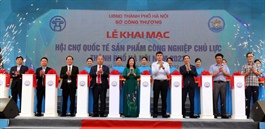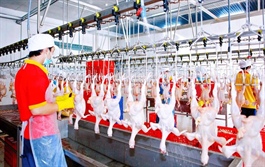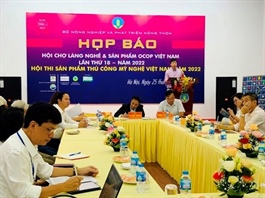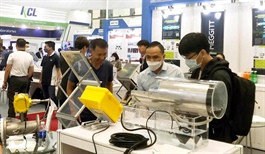South Koreans setting sights on expansions
South Koreans setting sights on expansions
Although Vietnam is well-placed both geographically and geopolitically to take advantage of South Korean investment waves, administrative procedures and supporting industries require further improvements in order to fully capitalise on them.

Bae Yong Geun, vice president of the Korean Chamber of Commerce and Industry in Vietnam told a forum last week in Hanoi that Vietnam is an important destination and the two countries have become closer co-operators over the years.
“More than 9,000 South Korean companies have entered Vietnam and cooperated in various fields such as manufacturing, energy, culture, education, and tourism,” said Geun at the event, titled Promoting Investment Flows from South Korea into Vietnam. “In the coming time, South Korean businesses will maintain their position as some of the largest investors in Vietnam.”
Vietnam is home to high-profile investors in a range of sectors from manufacturing and high-tech industries to energy, banking, and finance. In the first nine months of this year alone, South Korea ranked second out of 97 countries and territories investing in Vietnam with 290 projects, with the total registered investment capital of more than $3.8 billion, according to the Ministry of Planning and Investment (MPI).
However, some company leaders are warning of a slowdown if certain factors are not addressed. Yoon Chang Woo, general director of cold-rolled mill Posco Vietnam in the southern province of Ba Ria-Vung Tau, said, “In the southern provinces, so far, there seems to be no significant impact from the human resources supply or key infrastructure. However, as more enterprises participate in investment, there is concern that conditions may deteriorate due to limitations in human resources and infrastructure.”
“Even now, in the north where many South Korean enterprises have exported on a large scale, there have been complaints from enterprises about the shortage of human resources to supply,” he added.
He also pointed out weaknesses in Vietnam’s supporting industries, noting that Vietnamese enterprises have not been able to provide the highest quality components for Samsung Electronics and LG Electronics, so most of these parts are still imported from South Korea.
For the automobile industry, domestic automobile enterprises such as VinFast, Truong Hai, and Thanh Cong are actively producing, but in the form of importing components and assembling. The reality is that the growth of the auto parts manufacturing industry is still limited, according to Woo.
“If Vietnam wants to attract foreign investment in the most advanced technology fields, I think the government needs to have a specific plan to build and nurture the spare parts industry ecosystem, accompanied by accompanying policy support,” he said.
Meanwhile Koen Soenens, general sales and marketing director at DEEP C Industrial Zones, said that Vietnam has been an attractive investment destination and DEEP C will continue to expand new industrial zones to welcome more global investors with green investment.
“However, to capture and respond to investment trends in Vietnam, administrative procedures, supporting industries, and localities’ master plans must be improved,” he suggested.
In efforts to improve the supply chain, Samsung is launching a programme to help 50 Vietnamese businesses enhance their production capacity by developing smart factories. The business will receive assistance in consulting and transferring experience in establishing smart factory models, hence increasing production capacity. So far, 250 businesses have become tier 1 or tier 2 suppliers of Samsung.
Do Nhat Hoang, director general of the MPI’s Foreign Investment Agency, said multinational corporations are restructuring worldwide. “This is creating a wave of investment around the world and Vietnam is one of the options. However, we need to look at all sides of the problem. The opportunities can come, but we must be really effective with a competitive advantage to attract and retain investors,” Hoang said.
He pointed out possible actions include the completion of ecosystem planning and boosting both supporting industries and infrastructure. He cited a survey conducted by the MPI in collaboration with the Vietnam Business Forum last month, with the majority of questioned businesses expressing optimism and confidence in Vietnam and pledging to continue expanding investment in the nation. Two-thirds of those surveyed stated they planned to increase investment in 2023.
“This is the clearest evidence for the support and trust of the business community in Vietnam’s investment environment,” said Hoang.
























